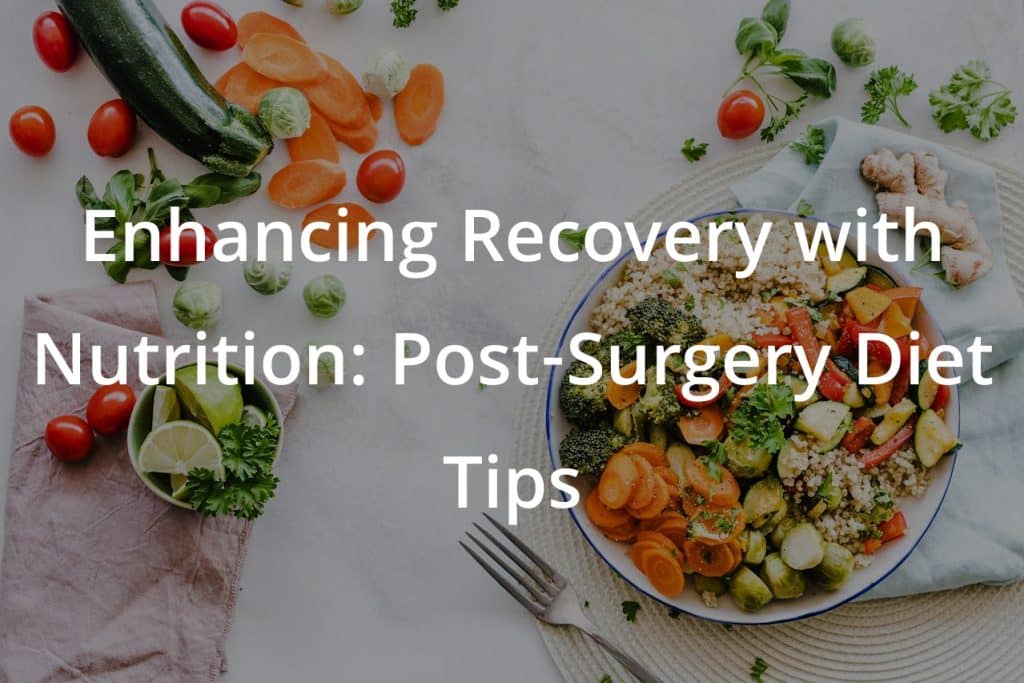
Recovering from surgery isn’t just about rest and medication—it’s also about fueling your body with the proper nutrients to accelerate healing and reduce the risk of complications. Under Dr. Som’s expert guidance, patients receive comprehensive care that includes tailored advice on nutrition to support their recovery journey. This blog explores the vital role of diet and nutrition in post-surgery recovery, offering practical dietary tips to promote healing and optimize overall outcomes.
The Importance of Nutrition in Surgical Recovery
Proper nutrition is crucial for healing because it provides the building blocks the body needs to repair tissues, fight infection, and regain strength. After surgery, the body’s nutritional demands increase significantly to support these processes. Inadequate nutrition can lead to slower wound healing, impaired immune function, and a higher risk of infections.
Key Nutrients for Post-Surgery Recovery
- Protein: Protein is essential for wound healing and repairing tissue damaged during surgery. It helps form collagen, which is vital for wound repair. High-quality protein sources include lean meats, fish, eggs, dairy products, beans, and legumes.
- Vitamins and Minerals:
- Vitamin C: This vitamin is critical for collagen synthesis and immune function. Sources include citrus fruits, strawberries, bell peppers, and broccoli.
- Vitamin A: Important for skin integrity and immune function, vitamin A can be found in sweet potatoes, carrots, spinach, and kale.
- Zinc: Zinc is important for wound healing, protein synthesis, and immune function. Nuts, seeds, meat, and seafood are good sources of zinc.
- Fiber: Post-surgery patients may experience digestive issues due to reduced mobility and certain medications. Fiber helps maintain bowel health. Sources of high-fiber foods include whole grains, vegetables, fruits, nuts, and seeds.
- Hydration: Staying hydrated is essential after surgery to help maintain blood volume, allow proper circulation of nutrients, and remove wastes. Water is best, but herbal teas and electrolyte solutions can also be beneficial.
Dietary Tips for Enhanced Surgical Recovery
- Plan Ahead: Before surgery, plan for your recovery by stocking up on nutritious foods that align with the dietary guidelines provided by your healthcare team. Consider preparing meals in advance and freezing them for convenience when you return home.
- Small, Frequent Meals: You may not have a large appetite after surgery. Instead of trying to eat three large meals, eat smaller, more frequent meals throughout the day to ensure you’re getting enough calories and nutrients.
- Manage Side Effects: If you experience common post-surgery symptoms like nausea, choose bland, easy-to-digest foods such as toast, crackers, and rice. Ginger tea can help alleviate nausea.
- Limit Processed Foods: Reduce intake of processed foods, which can be high in sugars and unhealthy fats. These can suppress immune function and contribute to inflammation, hindering healing.
- Incorporate Anti-Inflammatory Foods: Fatty fish like salmon, flaxseeds, walnuts, and the antioxidants found in berries and leafy greens can help reduce inflammation.
Supplements and Post-Surgery Nutrition
While getting nutrients from food is ideal, some patients might need supplements after surgery to meet their nutritional needs. Always consult with a healthcare provider before starting any supplements, as some can interfere with medications or the healing process.
- Multivitamins: A balanced multivitamin can help cover basic nutrient needs.
- Protein Supplements: If dietary protein intake is insufficient, consider protein shakes or powders recommended by your healthcare provider.
Monitoring Your Nutrition Post-Surgery
- Follow-Up Care: Regular follow-ups with your healthcare team should include diet and nutritional status discussions. This is crucial for adjusting your diet plan based on your recovery progress and any challenges you might face.
- Nutritional Support: Consider working with a registered dietitian if you have specific dietary needs or are struggling with nutrition post-surgery. A dietitian can provide personalized guidance to ensure your diet supports optimal healing.
Conclusion
Nutrition plays a pivotal role in your recovery after surgery. Focusing on a diet rich in essential nutrients can speed up your healing process, enhance your overall health, and reduce the likelihood of complications. At Dr. Som’s practice, we ensure that each patient has the knowledge and resources to make informed nutritional choices during recovery. Remember, the right food can be as powerful as medicine in helping your body heal from surgery.
Previous Post Next Post